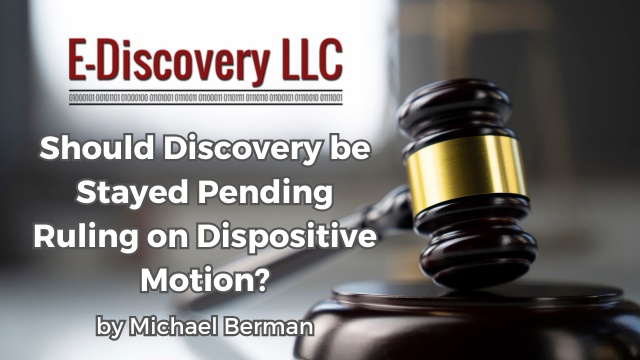
[EDRM Editor’s Note: The opinions and positions are those of Michael Berman.]
In Hernandez v. Event Tickets Center, Inc., 2025 WL 958193 (E.D. Ca. Mar. 31, 2025), the court denied defendant’s request to stay discovery pending a ruling on defendant’s motion to dismiss the complaint. Hernandez is a putative class action concerning the secondary ticket marketplace.
The stay was presented by plaintiff’s motion to compel. “Defendant argues that discovery in this case should be stayed pending the resolution of its motion to dismiss, that the requested discovery contains proprietary and confidential information, and stands on various of objections.” Id. at *1.
In denying the request to stay discovery, the Hernandez court first noted that it had wide discretion in controlling discovery. It wrote:
The ordinary course of litigation is for discovery to proceed in the face of a pending dispositive motion, and courts do not favor blanket stays of discovery because delaying or prolonging discovery can create unnecessary litigation expenses and case management problems.… On the other hand, a stay of discovery pending the resolution a potentially dispositive motion furthers the goal of efficiency for the courts and the litigants.
Id. (cleaned up).
The Hernandez court applied “a two-part test to determine if delaying discovery is appropriate: (1) whether the pending motion is potentially dispositive of the case, or at least would render unnecessary the discovery at issue; and (2) the pending motion can be decided absent additional discovery.” Id. at *2.
The Hernandez court applied “a two-part test to determine if delaying discovery is appropriate: (1) whether the pending motion is potentially dispositive of the case, or at least would render unnecessary the discovery at issue; and (2) the pending motion can be decided absent additional discovery.” Hernandez v. Event Tickets Center, Inc., 2025 WL 958193, *2 (E.D. Ca. Mar. 31, 2025).
Michael Berman, E-Discovery LLC.
The first part is not satisfied if a ruling would likely grant leave to amend, and a court should take a “preliminary peek” at the merits. Id. It considers factors such as whether the challenge is as a “matter of law” or based on sufficiency of the allegations. It also considers the complexity of the action and whether there are counterclaims or cross-claims. And, it evaluates the expected extent of discovery and any other relevant circumstances. Id.
In short:
The court must balance the harm produced by a delay in discovery against the possibility that the motion will be granted and eliminate the need for the discovery.
Id.
On the facts presented in Hernandez, the motion was potentially dispositive and did not depend on any discovery. However, a “preliminary peek” did not indicate that it was “likely to succeed.”
And, plaintiff’s pending motion to amend the Complaint also indicated a stay was not warranted. Further, the “first to file” argument that was the basis of the dismissal motion was not likely a pure matter of law because plaintiff argued that this case was factually distinct from the earlier one.
The court reasoned that the complexity of the motion and “and the possibility of leave to amend disfavor a stay of discovery.” Id. at*3.
Further, there is no indication that defendant has attempted to meet and confer regarding managing the discovery process in a manner that reduces burden yet moves the case forward.
Id.
The Hernandez court, having decided not to stay discovery, granted the motion to compel on other issues.
Assisted by GAI and LLM Technologies per EDRM GAI and LLM Policy.


